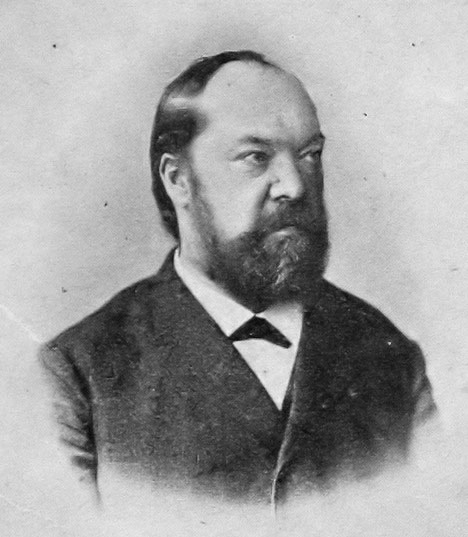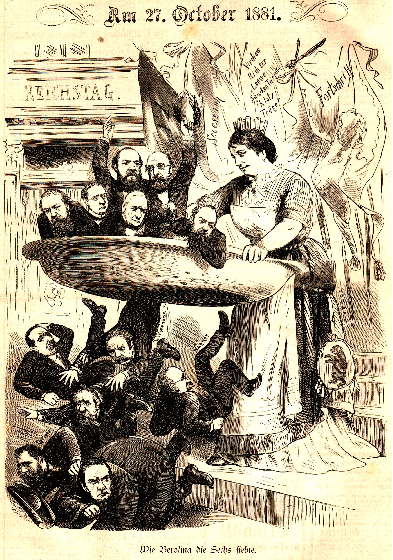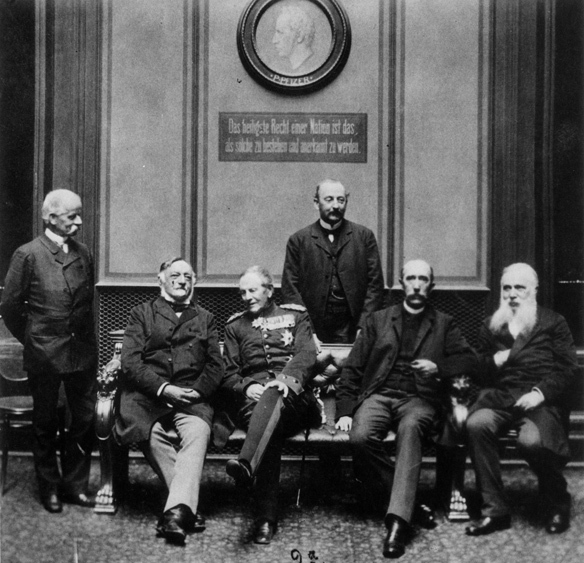|
1907 German Federal Election
Federal elections were held in Germany on 25 January 1907.Dieter Nohlen & Philip Stöver (2010) ''Elections in Europe: A data handbook'', p762 Despite the Social Democratic Party (SPD) receiving a clear plurality of votes, they were hampered by the unequal constituency sizes that favoured rural seats. As a result, the Centre Party remained the largest party in the Reichstag after winning 101 of the 397 seats, whilst the SPD won only 43.Nohlen & Stöver, p789 Voter turnout was 84.7%.Nohlen & Stöver, p775 This election was known as the " Hottentot election" due to the scandal over the ongoing genocide of the Khoisan people in German South West Africa. Campaign The election became known as the "Hottentot Election" because its causes and campaign were dominated by the Herero and Nama genocide in the colony of German South West Africa. The Nama were referred to as "Hottentots", a term that was derogatory even at the time. The sustained and increasingly expensive colonial wa ... [...More Info...] [...Related Items...] OR: [Wikipedia] [Google] [Baidu] |
Reichstag (German Empire)
The Reichstag (, " Diet of the Realm"), of the German Empire was Germany's lower House of Parliament from 1871 to 1918. Within the governmental structure of the Reich, it represented the national and democratic element alongside the federalism of the Bundesrat and the monarchic and bureaucratic element of the executive, embodied in the Reich chancellor. Together with the Bundesrat, the Reichstag had legislative power and shared in decision-making on the budget. It also had certain rights of control over the executive branch and could engage the public through its debates. The emperor had little political power, and over time the position of the Reichstag strengthened with respect to both the imperial government and the Bundesrat. Reichstag members were elected for three-year terms from 1871 to 1888 and following that for five years. It had one of the most progressive electoral laws of its time: with only a few restrictions, all men 25 and older were allowed to vote, secretly and ... [...More Info...] [...Related Items...] OR: [Wikipedia] [Google] [Baidu] |
German South West Africa
German South West Africa () was a colony of the German Empire from 1884 until 1915, though Germany did not officially recognise its loss of this territory until the 1919 Treaty of Versailles. German rule over this territory was punctuated by numerous rebellions by its native African peoples, which culminated in a campaign of German reprisals from 1904 to 1908 known as the Herero and Nama genocide. In 1915, during World War I, German South West Africa was invaded by the Western Allies in the form of South African and British forces. After the war its administration was taken over by the Union of South Africa (part of the British Empire) and the territory was administered as South West Africa under a League of Nations mandate. It became independent as Namibia on 21 March 1990. Early settlements Initial European contact with the areas which would become German South West Africa came from traders and sailors, starting in January 1486 when Portuguese explorer Diogo Cão, poss ... [...More Info...] [...Related Items...] OR: [Wikipedia] [Google] [Baidu] |
Free-minded Union
The Free-minded Union (; FVG) or Radical Union was a liberal party in the German Empire that existed from 1893 to 1910. Emergence Inside its predecessor, the German Free-minded Party, there had always been tensions between the leftist and the moderate wing. Another contentious point was the personalist style of leader Eugen Richter. When Chancellor Leo von Caprivi presented an army bill in parliament on 6 May 1893, seven Free-minded representatives, among them Georg von Siemens, decided to accept the motion. Consequently, Richter urged successfully the expulsion of the deviants. Other moderate party members, including Ludwig Bamberger and Theodor Barth, left voluntarily and formed the Free-minded Union. The left liberal wing of the Free-mindeds, loyal to Richter, assembled in the Free-minded People's Party The new party focused on political and economically liberal positions. In the federal election of 1893, it won 13 seats. The union was initially more a loose electoral ... [...More Info...] [...Related Items...] OR: [Wikipedia] [Google] [Baidu] |
Free Conservative Party
The Free Conservative Party (, FKP) was a Liberal conservatism, liberal-conservative political party in Kingdom of Prussia, Prussia and the German Empire which ran as the German Reich Party (, DRP) in the federal elections to the Reichstag (German Empire), Reichstag beginning in 1871. The party was formed when it split from the Conservative Party (Prussia), Prussian Conservative Party in 1866. It was a minimally organized "party of notables" whose members came largely from the wealthier upper classes. Politically, the Free Conservatives stood between the German Conservative Party and the National Liberal Party (Germany), National Liberal Party. During the chancellorship of Otto von Bismarck, it generally gave him its strong support, and many of its members were ministers and diplomats. After Wilhelm II became emperor in 1888, the party lost a significant portion of its earlier strength. It took a staunchly nationalist stance during World War I and disbanded in 1918 during the ea ... [...More Info...] [...Related Items...] OR: [Wikipedia] [Google] [Baidu] |
Free-minded People's Party (Germany)
The Free-minded People's Party (, FVP) or, more rarely translated as the Radical People's Party, was a social liberal party in the German Empire founded in 1893 as a result of the split of the German Free-minded Party. Dominated by Eugen Richter, who was party leader from 1893 until his death in 1906, the left-liberal FVP advocated parliamentarism, free trade and legal recognition of trade unions. It was generally critical of the government and in opposition to it. The FVP was disbanded in 1910 after the Free-minded Union and German People's Party joined with it to form the Progressive People's Party. Formation The German Free-minded Party (DFP), the party that split to create the Free-minded People's Party, was formed in 1884 by a merger of the German Progress Party and the Liberal Union. From the beginning there had been tensions between the left wing of the Progress Party and the right wing of the Liberal Union. They came to a head on 6 May 1893 when and five other fo ... [...More Info...] [...Related Items...] OR: [Wikipedia] [Google] [Baidu] |
Września School Strike
Września () is a town in west-central Poland near Poznań, with 28,600 inhabitants (1995). It is situated in the Września County, Greater Poland Voivodeship, on the Wrześnica River. History Września was first mentioned in 1256 in a document issued in Poznań. Early sources speak of Wressna (1317) or Wresna (1364). Września was granted town privileges before 1357. It was a private town, owned by various Polish nobles families, administratively located in the Kalisz Voivodeship of the Greater Poland Province of the Kingdom of Poland. The coat of arms of Września is the Poraj coat of arms of the Poraj family, the first owners of the town. Annual fairs and weekly markets took place in the town. The town was burned down 1664 (other sources speak of 1656) in the war against Sweden. The majority of inhabitants were Poles, but since mid-17th century there have also been German settlers. The town was annexed by the Kingdom of Prussia in 1793, following the Second Partition o ... [...More Info...] [...Related Items...] OR: [Wikipedia] [Google] [Baidu] |
Upper Silesia
Upper Silesia ( ; ; ; ; Silesian German: ; ) is the southeastern part of the historical and geographical region of Silesia, located today mostly in Poland, with small parts in the Czech Republic. The area is predominantly known for its heavy industry (mining and metallurgy). Geography Upper Silesia is situated on the upper Oder River, north of the Eastern Sudetes mountain range and the Moravian Gate, which form the southern border with the historic Moravia region. Within the adjacent Silesian Beskids to the east, the Vistula River rises and turns eastwards, the Biała and Przemsza tributaries mark the eastern border with Lesser Poland. In the north, Upper Silesia borders on Greater Poland, and in the west on the Lower Silesian lands (the adjacent region around Wrocław also referred to as Middle Silesia). It is currently split into a larger Polish and the smaller Czech Silesian part, which is located within the Czech regions of Moravia-Silesia and Olomouc. The P ... [...More Info...] [...Related Items...] OR: [Wikipedia] [Google] [Baidu] |
Polish Party
The Polish Party () was a political party in the German Empire and the Free City of Danzig. Representing the Polish population in Germany, it was the largest of the minority parties. History The party had its origins in the national associations that were established during the 1848 revolution, but was formally established when the first Reichstag was elected in 1871.Vincent E. McHale (1983) ''Political parties of Europe'', Greenwood Press, p428 It won 13 seats in the elections, the lowest number of seats it held in the Reichstag until World War I. Its best performance was in the 1907 elections, when it won 20 seats.McHale, p434 Following the war and the loss of Polish-dominated territory to newly established Poland Poland, officially the Republic of Poland, is a country in Central Europe. It extends from the Baltic Sea in the north to the Sudetes and Carpathian Mountains in the south, bordered by Lithuania and Russia to the northeast, Belarus and Ukrai ..., the par ... [...More Info...] [...Related Items...] OR: [Wikipedia] [Google] [Baidu] |
Eugen Richter
Eugen Richter (30 July 183810 March 1906) was a German politician and journalist in Imperial Germany. He was one of the leading Old Liberals in the Prussian Landtag and the German Reichstag. Career Son of a combat medic, Richter attended the Gymnasium in his home town of Düsseldorf. In 1856 he began to study Law and Economics, first at the University of Bonn, and later at the Berlin and Heidelberg. He obtained a law degree in 1859. Richter became a strong advocate of free trade, a market economy, and a Rechtsstaat; views he held for all his life. In 1859 he became a civil servant in the judiciary. He achieved some renown for his essay ''Über die Freiheit des Schankgewerbes'' (On the liberty of the tavern trade). His liberal views caused some trouble with the Prussian bureaucracy. In 1864 he was elected the mayor of Neuwied, but the president of the provincial government refused to confirm his election result. Richter left the civil service, and became the parliamentary corre ... [...More Info...] [...Related Items...] OR: [Wikipedia] [Google] [Baidu] |
Wilhelm II
Wilhelm II (Friedrich Wilhelm Viktor Albert; 27 January 18594 June 1941) was the last German Emperor and King of Prussia from 1888 until Abdication of Wilhelm II, his abdication in 1918, which marked the end of the German Empire as well as the House of Hohenzollern, Hohenzollern dynasty's 300-year rule of Prussia. Born during the reign of his granduncle Frederick William IV of Prussia, Wilhelm was the son of Frederick III, German Emperor, Prince Frederick William and Victoria, Princess Royal. Through his mother, he was the Descendants of Queen Victoria, eldest of the 42 grandchildren of Queen Victoria of the United Kingdom. In March 1888, Wilhelm's father, Frederick William, ascended the German and Prussian thrones as Frederick III. Frederick died just 99 days later, and his son succeeded him as Wilhelm II. In March 1890, the young Kaiser dismissed longtime Chancellor Otto von Bismarck and assumed direct control over his nation's policies, embarking on a bellicose "New Course ... [...More Info...] [...Related Items...] OR: [Wikipedia] [Google] [Baidu] |
Bernhard Von Bülow
Bernhard Heinrich Karl Martin, Prince of Bülow ( ; 3 May 1849 – 28 October 1929) was a German politician who served as the chancellor of the German Empire, imperial chancellor of the German Empire and minister-president of Prussia from 1900 to 1909. A fervent supporter of ''Weltpolitik'', Bülow devoted his chancellorship to transforming Germany into a global power. Despite presiding over sustained economic growth and major technological advancements within his country, his government's foreign policy did much to antagonize France and Great Britain thereby contributing significantly to the outbreak of the World War I, a conflict that resulted in the fall of the German Empire. Born into a prominent family of Danish-German aristocrats, Bülow entered the German foreign service after his father, Bernhard Ernst von Bülow, was appointed foreign secretary in Otto von Bismarck's government. He held several diplomatic posts, including German ambassador to Rome, before being appointed ... [...More Info...] [...Related Items...] OR: [Wikipedia] [Google] [Baidu] |
German Conservative Party
The German Conservative Party (, DkP) was a Right-wing politics, right-wing political party of the German Empire founded in 1876. It largely represented the wealthy landowning German nobility and the Prussian Junker (Prussia), Junker class. The party was a response to German unification, Universal suffrage, universal and equal franchise in national elections and rapid industrialization. It changed from a diffuse party of broad ideology into an interest party in Bismarckian Germany. In the early 1870s, Otto von Bismarck formed his majority with the base in the National Liberal Party (Germany), National Liberal Party which emphasized free trade and anti-Catholicism. Bismarck broke with them in the late 1870s, by which time the German Conservative Party and the Free Conservative Party had brought together the landed Junkers in the East and the rapidly growing industrial leadership in the major cities. They now became the main base of Bismarck's support and successive Chancellor of Ger ... [...More Info...] [...Related Items...] OR: [Wikipedia] [Google] [Baidu] |




